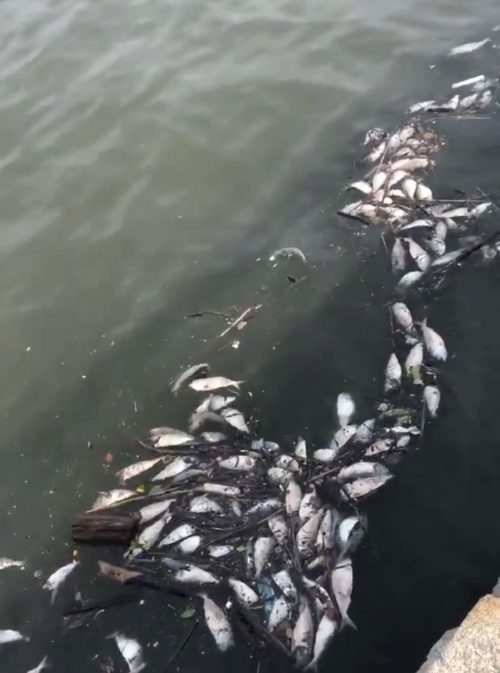
By Carol Tannenhauser
It was hard to bear: the sight of hundreds, maybe, thousands, of dead fish floating in the Hudson River for the past week, and the smell of them decaying. Commenters to a previous story we posted called it, “horrifying”… “depressing”… “an atrocity!”
”We need to keep the focus on the fish,” George Jackman, PhD, chided, in a phone conversation. “It’s not always about our discomfort.”
Dr. Jackman is Senior Habitat Restoration Manager at Riverkeeper, a nonprofit organization that protects and restores the Hudson. The fish in question are called menhaden or bunker.
“Atlantic menhaden are very sensitive to environmental conditions,” said a spokesperson for the New York State Department of Environmental Conservation (DEC). “For more than a month, there has been little rainfall, very low freshwater input (flushing) into the system and a quick rise in water temperature, resulting in a drop in dissolved oxygen, creating hypoxia (a condition where not enough oxygen makes it to the cells and tissues in the body.) Adding these conditions to the sensitivity of the species, the estuary had become a very stressful environment. The result was death by a lack of sufficient dissolved oxygen. (They suffocated.) This type of fish die-off incident occurs naturally this time of year when water temperatures warm.”
Hundreds of dead fish floating along the Hudson River this morning pic.twitter.com/li7UvC75GU
— UWSLive (@UWSLive) July 8, 2020
Dr. Jackman called 2020, “an extreme year in terms of the menhaden die-off, which hints at the fragility of an ecosystem, and one that is out of balance. It also forebodes of things to come with climate change. The river is becoming warmer. It is on average 4° warmer in the past 30 years, and the extreme temperatures are higher than ever before. I have seen temperatures north of 83°. That is hot for a fish. In fact, rainbow smelt have been completely extirpated from the Hudson, and tomcod and winter flounder are on their way out.”
As for the question of who will dispose of the dead, the state said it is the city’s responsibility. The city said “talks are going on about the best way to address the situation.” Dr. Jackman said, “I was out on the river the other day and saw fish crows and herring gulls enjoying the bonanza of the menhaden buffet. I am sure raccoons will avail themselves of the free meal, too. Also, the crabs, eels, and other detritivores living in the river will quickly consume the organic matter. That’s nature.”
“The question of smell makes me chuckle a little,” Dr. Jackman concluded. “It reminds me of someone who moves next to a farm and complains about the smell. Nevertheless, if you turn over a menhaden, it can smell putrid.”
If you’re interested in learning more about fish and/or helping the Hudson River, go to the Riverkeeper website here.
Addition: Dr. Jackman emailed to say, “If there were multiple species dying it would be more of a problem, but we are only seeing menhaden.”









I would like to see the physical science behind this explanation. I checked the water temp for June & July and it was exactly in line with the average historical water temp of the Hudson for many years. The only way to understand this die off would be to take river quality analysis along the shore to look into disolved oxygen, water quality/contamination etc. At the same time fish autopsies should be done. When you find such a large kill over quite a few days it is important to find out why to see if there is some problem that could cause a human health condition. It might be that the dead fish are our ‘canaries in the coal mine’.
Thank you, Henry Parsons! I second that. Definitely scientists should have checked this out and this general explanation of climate change is unscientific. It might be too late to check out the cause of the fish dying now since they have mostly disappeared. A good friend who has visited the Hudson daily for 50 years, told me she has never seen such a huge amount of fish die. I read an explanation of pollution / fertilizer/ algae combined with less oxygen due to a drought causing hypoxia?
I saw a number of them still trying to breathe and swim, but clearly it was a lost cause. I have some videos of them.
While I’m certainly not questioning the science on river temps, it has certainly NOT been a dry June on the Upper West Side. It’s been almost tropical and we’ve had a string of magnificent thunderstorms (remember the hail?). So I, for one, am concerned that something else could be causing these die-offs. Anybody call Indian Point?
Not credible.
The water temperature is still moderate at this time of year, relatively early in season. Water warms/cools way slower than air, not abruptly.
THE warm water will be in early September, NOT early July.
Is this same pheromone happening in the East River as well? If not, why? Is the East River deeper, an heats up slower than maybe a shallower Hudson?
I live really close to the Hudson and have witnessed the increase in dead fish over the past several week. One thing I’ve been wondering about this entire time is: why aren’t the seagulls having a heyday with this endless buffet of fish?! Perhaps I am missing something about the seagull diet (very possible), or, I wonder if it says something about the fish’s toxicity. Any thoughts?
I biked to the park by the GWB and the whole grass area was filled with dead fish (some half eaten) presumably dropped by birds. I wear a good mask but the rotting fish smell permeated it. Added to the post-apocalyptic mask-wearing (a supporter) landscape.
Whether the information is credible or not, I can’t move my eyes from “Atlantic menhaden are very sensitive to environmental conditions…”.
I think something is reflecting back to us. And that is how many of us humans are very sensitive to environmental conditions, in whatever aspect of “environment” we are reading about. I wonder if we can even grasp that idea. COVID19 is a good example to help open the door to awareness.
A deeper message in this story.
Have there been any autopsies / investigations of the fish? Climate change is real but maybe it was a pollutant or toxin that was released into the river?
This explanation is complete bs.
We’ve had many warmer and drier Summer streaks and there have NEVER been tons of dead fish in the water.
There is much more to this story and our ignorant government officials clearly don’t want to take the time to figure it out. These are probably the same idiots who say that the virus “will just disappear over time.”
It doesn’t take a scientist to realize this is much more than “global warming.”
Something else is killing these fish and these idiots need to take the time to figure it out. Why do we have so many science-denying, completely ignorant, uneducated dolts in office? This is so concerning.
What has happened to humanity??
I’m a New Yorker and would love to help.
Duh! D.E.C. is corrupt and irresponsible for New York’s environmental woes. As a retired Fish and Wildlife Technician I can attest to their callousness!
This is terrible. Have the fish been removed from the river to be studied further? There were piles of dead fish floating in the river for days and it was a sad sight. However, I went to the river yesterday and did not see any fish. Did they float upstream or were they removed? Just curious.